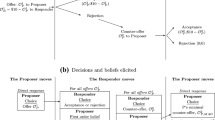Abstract
A series of experiments compares bargaining behavior under three different settings: no arbitration, conventional and final-offer arbitration. Under no arbitration, disputes with zero payoffs were around 10%, while the pie was equally split in less than half of the cases. Under conventional arbitration – where the arbitrator is free to choose his award – every third negotiation ended in dispute, evidencing a modified chilling effect. Under final-offer arbitration – where the arbitrator must award the bargainers either one of their final offers – there was only a small increase in disputes, while equal splits doubled to 80%. The experiment shows that final-offer arbitration, despite having lower dispute rates, interferes more with bargaining behavior than conventional arbitration, where bargaining behavior is similar to that seen in the no-arbitration treatment. Under final-offer arbitration, negotiators adjust their bargaining strategy on the arbitrator’s expected award.
Similar content being viewed by others
References
Armstrong MJ, Hurley WJ (2002) Arbitration using the closest offer principle of arbitrator behavior. Math Soc Sci 43:19–26
Ashenfelter O, Bloom DE (1984) Models of arbitrator behavior. Am Econ Rev 74:111–124
Ashenfelter O, Currie J (1990) Negotiator behavior and the occurrence of disputes. Am Econ Rev, Papers Proc 80:416–420
Ashenfelter O, Currie J, Farber HS, Spiegel M (1992) An experimental comparison of dispute rates in alternative arbitration systems. Econometrica 60:1407–1433
Babcock L, Loewenstein G, Issacharoff S, Camerer C, (1995) Biased judgments of fairness in bargaining. Am Econ Rev 85, 1337–1343
Bloom DE (1981) Is arbitration really compatible with bargaining? Indu Relat 20:233–244
Bolton GE (1991) A comparative model of bargaining: theory and evidence. Am Econ Rev 81:1096–1136
Bolton GE (1995) Arbitration and chilling: challenging the convention. Discussion Paper No. B-345, SFB 303, Universität Bonn
Borchardt K (1990) A decade of debate about Brüning’s economic policy. In: Kruedener, J (ed.) Economic crisis and political collapse. The Weimar Republic 1924–1933, New York: pp. 99-151
Brams SJ, Merrill S (1986) Binding versus final-offer arbitration: a combination is best. Manag Sci 32:1346–1355
Camerer CF, Hogarth RM (1999) The effect of financial incentives in experiments: a review and capital-labor-production framework. J Risk Uncertainty 19:7–42
Charness G (1996) Alternative dispute resolution and the settlement gap. In: Anderson D.A (eds) Dispute resolution: bridging the settlement gap. JAI, London, pp. 205-235
Charness G (2000) Bargaining efficiency and screening: an experimental investigation. J Econ Behav Org 42:285–304
Charness G. Rabin M (2002) Understanding social preferences with simple test. Q J Econo 117:817–869
Chatterjee K, Samuelson W (1983) Bargaining under incomplete information. Oper Res 31:835–851
Crawford VP (1979) On compulsory-arbitration schemes. J Polit Econ 87:131–159
Currie J, McConnell S (1991) Collective bargaining in the pubic sector: the effect of legal structure on dispute costs and wages. Am Econ Rev 81:693–718
Deck CA, Farmer A (2003) Bargaining with asymmetric uncertainty: arbitration mechanisms compared. Disc Paper, University of Arkansas
Dickinson DL (2004) A comparison of conventional, final-offer, and combined arbitration for dispute resolution. Ind Labor Relat Rev 57:288–301
Donn CB (1977) Games final-offer arbitrators might play. Ind Relat 16:306–314
Falk A, Ichino A (2003) Clean evidence on peer pressure. Disc. Paper, University of Zurich
Farber HS, Bazerman MH (1986) The general basis of arbitrator behavior: an empirical analysis of conventional and final-offer arbitration. Econometrica 54:1503–1528
Farber HS, Katz HC (1979) Interest arbitration, outcomes, and the incentive to bargain: the role of risk preferences. Ind Labor Relat Rev 33:55–63
Feuille P (1975) Final offer arbitration and the chilling effect. Ind Relat 14:302–310
Forsythe R, Horowith JL, Savin NE, Sefton M (1994) Fairness in simple bargaining experiments. Games Econ Behav 6:347–369
Forsythe R, Kennan J, Sopher B (1991) An experimental analysis of strikes in bargaining games with one-sided private information. Am Econ Rev 81:253–278
Güth W (1995) On ultimatum bargaining experiments – a personal review. J Econ Behav Org 27:329–344
Kennan J, Wilson R (1990a) Theories of bargaining delays. Science 249(7):1124–1128
Kennan J, Wilson R (1990b) Can strategic bargaining models explain collective bargaining data. Am Econ Rev, Papers Proc 80:405–409
Kennan J, Wilson R (1993) Bargaining with private information. J Econ Lite 31: 45–104
Leuven E, Oosterbeek H (2003) The effect of financial rewards on students’ achievements: evidence from a randomized experiment. CEPR Disc. Paper No. 3921
Malouf MWK, Roth AE (1981) Disagreement in bargaining: an experimental study. J Conflict Resolut 25:329–348
Neelin J, Sonnenschein H, Spiegel M (1988) A further test of noncooperative bargaining theory: comment. Am Econ Rev 78: 824–836
Ochs J, Roth AE (1989) An experimental study of sequential bargaining. Am Econ Rev 79:355–384
Roth AE (1995) Bargaining experiments. In: Kagel J, Roth A.E (eds) Handbook of experimental economics. Princeton University Press, Princeton, pp. 253-348
Roth AE, Murnighan JK (1982) The role of information in bargaining, an experimental study. Econometrica 50:1123–1142
Rubinstein A (1982) Perfect equilibrium in a bargaining model. Econometrica 50:97–109
Siegel S, Castellan N (1988) Nonparametric statistics for the behavioral sciences. McGraw-Hill, Boston
Stern JL, Rehmus CM, Loewenberg JJ, Kasper H, Dennis BB (1975) Final-offer arbitration. Heath-Lexington, Lexington Mass
Stevens CM (1966) Is compulsory arbitration compatible with bargaining?. Ind Relats 5:38–52
Weg E, Rapoport A, Felsenthal DS (1990) Two-person bargaining behavior in fixed discounting factors games with infinite horizon. Games Econ Behav 2:76–95
Wheeler HN (1978) How compulsory arbitration affects compromise activity. Ind Relat 17:80–84
Wirtz W (1963) Address before national academy of arbitrators. Daily Labor Report 23:1–4
Author information
Authors and Affiliations
Corresponding author
Rights and permissions
About this article
Cite this article
Kritikos, A.S. The Impact of Compulsory Arbitration on Bargaining Behavior: An Experimental Study. Economics of Governance 7, 293–315 (2006). https://doi.org/10.1007/s10101-006-0011-2
Received:
Accepted:
Published:
Issue Date:
DOI: https://doi.org/10.1007/s10101-006-0011-2




